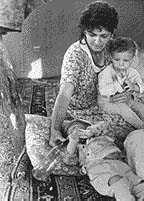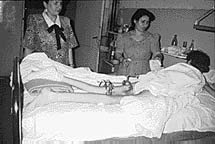|

Spring 1994 (2.1)
Page 16
Hospitals in
Baku
Empty
Shelves, Barren Closets, Compassionate Doctors
- by Margaret D. Fox
Unocal's Medical Administrator
For the last several years, I've been working internationally
as a Medical Advisor for Unocal. So when I was assigned to Azerbaijan,
I barely hesitated; in fact, I was rather eager to go to this
country that the Western world knows so little about.
When I arrived in Baku several months ago, one of my first tasks
was to check out the local medical amenities and identify suitable
local facilities, clinics and hospitals for our personnel to
use should such a need arise. Now, I've seen many hospitals in
my travels throughout the world, many of which were in Third
World countries. However, nothing in the whole world prepared
me for the situation that exists in Azerbaijan. In my entire
experience, I have never seen such shortages of medical supplies
and equipment in so many hospitals as I have in this country.
The dissolution of the Soviet Union's interrelated infrastructure,
which is now compounded by the war, has left, virtually, all
the Azerbaijan medical closets barren. There is a severe shortage
of all supplies, equipment, and pharmaceuticals. One doctor confided
to me, "How do you go about deciding which medical supplies
are more essential than others when everything is vital for the
successful operation of a hospital?" Prices of every item
relating to medicine have escalated at an unprecedented rate,
making it almost impossible for hospitals to buy anything.
  Left: Though Baku families tend to have
only one or two children, the national average is four. One in
ten refugees is a child under the age of five. Left: Though Baku families tend to have
only one or two children, the national average is four. One in
ten refugees is a child under the age of five.
Refugee mother from Agdam (Summer 1993).
Photo: Oleg Litvin.
Not a single one of the medical
establishments I visited had more than a few dozen disposable
syringes and needles. Many had none. They have to wash and sterilize
glass syringes in boiling water, and clean, sharpen and sterilize
the needles. Even though disposable syringes and needles are
relatively cheap, they are impossible to buy in sufficient quantity.
In one of the maternity hospitals, I was told that women in labor
have to provide their own pain killers, as none are available
in the hospital. Despite the trend for natural childbirth in
the West, I think most of us would be horrified to know there
would be no analgesia available were it needed. One can only
speculate of the pain and suffering endured by women who have
difficult labors and who could neither afford, nor find, suitable
pain killers prior to their admission to the hospital.
I noticed that there is a great lack of even the most basic equipment
in the hospitals. I saw surgeons operating without gloves, and,
in some cases, even without anesthetics. Equipment , which we
normally take for granted, such as X-ray machines, scanners,
and electric support equipment are in very short supply. There
are very few diagnostic machines and breakdowns are frequent.
Many are caused by power cuts and surges. Almost all of the equipment
is imported, and, therefore, it is virtually impossible to find
anyone who can provide service, much less, provide spare parts.
Even items such as electrical bulbs and other minor spare parts
that we would regard as inconsequential, are almost impossible
to obtain.
Consumable items for x-ray ma-chines-developing fluid, for example,
and reagents for the pathological diagnostic tests-are unbelievably
difficult to find. Hence, there is (to us, anyway) an unacceptable
delay in arriving at a diagnosis. This is not due to the ineptitude
of the medical staff, but rather the contrary. The fact that
they are able to reach any diagnosis at all is an incredible
tribute to the medical staff under such circumstances.
The doctors and other health care staff are as frustrated as
anyone by their total inability to purchase what is needed for
the welfare of their patients. Even if the money were available,
it is dubious that the supplies would be. As is true in city
pharmacies in many countries, both prescription and non-prescription
drugs are available for purchase, but only in extremely limited
quantities. Even when a doctor writes a prescription or recommends
a treatment, it may not be available. The patient then has to
inquire of all pharmacies, return to the doctor for a revision
of the prescription, or settle for the nearest prescribed treatment
that is available.
When I visited one of the children's hospitals, I again witnessed
extreme shortages of medical equipment and the total unavailability
of medical equipment. Despite these shortages, surgeons carried
out fairly complex operations to correct deformities of the spine
and long bones. Without such surgery, the children could not
hope to live normal lives. The hospital was extremely Spartan
and there was certainly no money for books, toys or tuition for
the children during their stay. However, the nursing staff appeared
to be extremely caring, and did their best for the children despite
these very difficult circumstances.
In spite of the pain and discomfort following major surgery,
the summer heat and total lack of any distractions, the children,
for the most part, weren't complaining. Visitors are allowed
into the hospital for most of the day as is the current trend.
Many of the children had relatives around their beds, helping
with meals or trying to amuse and distract them from their discomfort.
In many places in the world, attempts to run a hospital under
such conditions would have long since been abandoned. But in
Azerbaijan, patients are still admitted to the hospitals. Since
there is a shortage of bed linens, relatives simply bring them
along. Here in Baku, this is almost business as usual. Despite
the difficulty in obtaining sutures and dressings, operations
are still performed.
Babies are still delivered and illnesses are still treated. I've
been in hospitals where it's almost impossible to see where one
is going in the corridors because there are no light bulbs.
One can only admire the resourcefulness of the Azerbaijani hospital
staffs who cope with the shortages and constraints. Doctors work
for a salary of approximately $15 a month, and nurses earn much
less. Despite this, the work goes on.
  Left: Despite shortages, surgeons still
carry out complex operations to correct deformities on bones. Left: Despite shortages, surgeons still
carry out complex operations to correct deformities on bones.
Humanitarian aid has been donated
from several sources over the last twelve months. However, this
is only a comparative drop in the ocean when one considers what
is actually needed. The other problem with humanitarian aid,
of course, is that hospitals receive only what is sent. Supplies,
welcome though they may be, are not necessarily what is most
needed. Nor can one ever be sure how long it will be until the
next shipment arrives. When one is dependent on goodwill, patience
is required, so some of the aid is reserved "for when it
is really needed." Since all of these supplies have expiration
dates, out-of-date supplies are often used out of sheer desperation.
During my visits to these medical establishments, I have always
been made to feel welcome. The medical staff were eager to share
their concerns and problems with me, together with the solutions
they had found. As "necessity truly is the mother of invention,"
innovative answers had been found to problems which I would have
considered insurmountable. Several of the doctors with whom I
spoke had attended international conferences to present very
original research.
While ideas of medicine here differ vastly from what we, in the
Western world, are used to, new ways to improve techniques and
standards of care are being sought vigorously. There is a thirst
for knowledge and for an exchange of information with Western
countries, something which has previously been impossible. Western
medical textbooks and journals are eagerly sought so that the
medical professionals in Azerbaijan can find out what developments
are taking place in the rest of the world.
No one can expect the people in Azerbaijan to be content with
these drastic shortages. But they are coping with fortitude,
resourcefulness, and realism. Many of them speak with hope for
the future when the situation in Azerbaijan will have stabilized,
both politically and economically. At that time they believe
there will be money available for equipment and research. One
can only speculate what Westerners would do if faced with similar
circumstances in their own countries. Hopefully, we shall never
know.
From Azerbaijan International (2.1) Spring 1994.
© Azerbaijan International 1994. All rights reserved.
Back
to Index AI 2.1 (Spring 1994)
AI Home Page| Features
|


